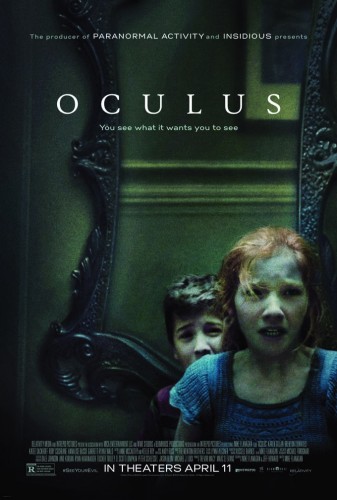Oculus
 Oculus Directed by: Mike Flanagan Cast: Brenton Thwaites, Karen Gillan, Katee Sackhoff, Rory Cochrane, Annalise Basso, Garrett Ryan Running Time: 1 hr 45 mins Rating: R Release Date: April 11, 2014
Oculus Directed by: Mike Flanagan Cast: Brenton Thwaites, Karen Gillan, Katee Sackhoff, Rory Cochrane, Annalise Basso, Garrett Ryan Running Time: 1 hr 45 mins Rating: R Release Date: April 11, 2014
PLOT: Two siblings (Gillan and Thwaites) try to prove that a demonic mirror is to blame for a traumatic event that destroyed their family.
WHO'S IT FOR? Those who enjoy Blumhouse Horror films such as Insidious, but more for the ideas in place than the actual scares.
OVERALL
The harbinger of doom in Oculus is an old-ass mirror, an ironically useless antique that efficiently aligns its housing film with the Hooters ethos of "delightfully tacky, yet refined." A filthy slab of glass placed within a frame by a 1700s goth trying too hard, there is a playful wink in its mistaken value as schmancy interior design. True to the film's awareness as a B-movie attempting A-grade horror, Oculus is hip as to what lengths a mirror can seriously terrorize. Characters joke about it like it's a hungry beast ("the mirror eats dogs" may be a piece of dialogue never before spoken in film), yet the prop maintains its necessary ominous quality, the idea of characters staring directly at it in any point of the film creating a striking amount of unease.
This awareness points towards a purity that defines the little surprise that is Oculus, allowing it to stand with integrity as more than just a spooky horror story. Focusing on siblings attempting to explain vicious childhood trauma (not a married couple, or a group of friends), Oculus plays out as an extremely vivid flashback. Its special pull is that it has more bumps in the night than a usual domestic drama.
Oculus separates itself from regular ghost stories as well with its meticulously disorienting perspective. Especially for horror movies, the camera has often become a subjective safety net of truth. But as seen in Oculus, where cameras only appear as toys to the force these siblings are challenging, there is no stable answer - in footage, or in memories. Without squatting on the "Is it all in their heads?" super-lame twist, this tale of childhood trauma provides no sense of gravity for its reality. This idea goes beyond the characters, and to the audience. Our reliance on the film's camera as ultimate fact is toyed with cleverly, misleading the viewers along with the characters in some points, while allowing us an outside perspective. Even then, the idea of an overarching true story becomes so hazy it is easier to just accept the film's as simply a series of ideas.
Some elements that imperfect Oculus are out of his control, or out of mind. The acting can be a bit rough, with the children (Annalise Basso and Garrett Ryan) equal in quivering line-delivery than their young adult counterparts (Karen Gillam and Brenton Thwaites); a compliment to one, and not-so-much to the other. Oculus' domestic terror is centered with an eerie coldness from Rory Cochrane, who sophisticates a spaced-out father past the strangeness of blank stares.
By the film's climax, Flanagan confirms that he is stronger at tension than scare showmanship. As a storyteller he has an awareness to the tropes that shall always haunt these stories, like wavering electricity, or human beings going against their original specific plan. Wanting his own piece of the pie, Flanagan uses these devices plainly, a diversion from the otherwise inspired moments to be found in this film.
Oculus' eerie sense of danger slowly subsides as it continues, especially when its evil fully unveils itself in the third act. As its story gets progressively intriguing, the scares of Oculus retread to the idea that keeps many of these spooky tales recurrent in movies - that ghosts do exist, but mostly to make our lives a living hell.
FINAL SCORE: 6/10